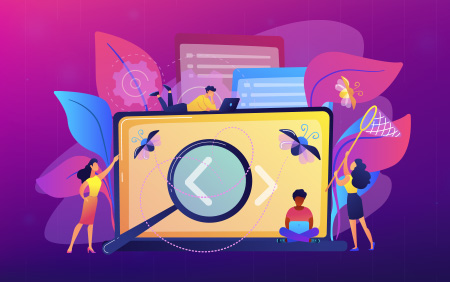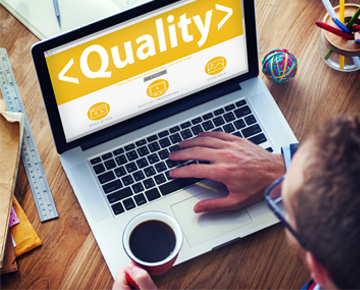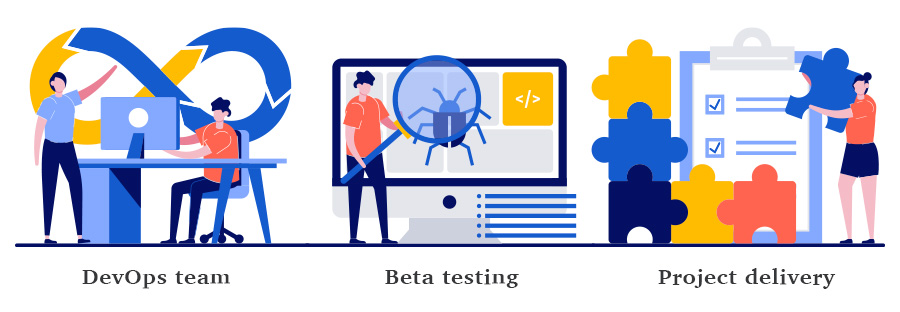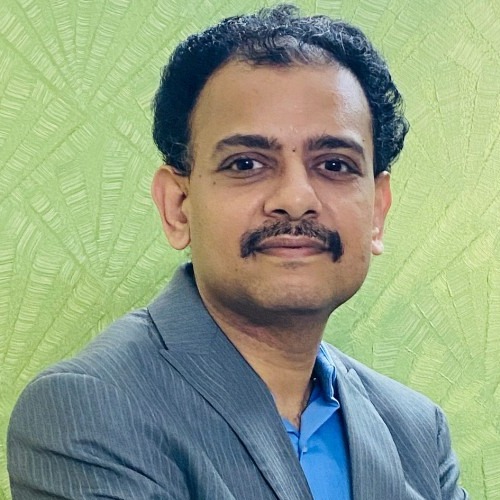
Software quality assurance currently stresses upon the speed of delivery of apps on top of quality through the implementation of better QA practices that includes DevOps. Supporting faster development through automation and DevOps CI/CD is considered the better alternative to old QA methods.
According to Gartner, “By 2024, three-quarters of large enterprises will be using AI-enabled test automation tools that support continuous testing across the different stages of the DevOps life cycle”.
To focus on evolving QA into a more transformative Quality Engineering (QE), Innominds has focused on employing AI-enabled testing tools and practices for greater speed to market and lowered investments in both time and money. We became a strategic QE Partner for testing automation services and CI/CD for a global cloud data platform client company by embracing this new methodology.
Companies usually restrict testing to just the front-end of development and the UI. This just touches the tip of the iceberg as QE needs to cover all aspects of development even unto post production.
However, the client wanted something different for their cloud platform and much more impactful for their product launches. Their product is a data platform in the cloud for real-time data search for application management, security and compliance, and analytics purposes.
Stuck with a lack of processes in place for a faster go-to-market strategy, they were in search for a tool that would increase productivity by bringing automation. The requirement was mainly indented to augment the testing team’s capabilities for test automation and productivity improvements across various projects.
Innominds could take the client’s QE team a step further by analyzing business requirements to implement test automation, CI/CD enablement and platform migration to achieve a comprehensive testing scenario. Such advanced QE activities are closely supported by the Innominds Global Delivery Centre in Hyderabad, India, for enterprise security, IT service intelligence, stream and DB connect.
As a result, we were able to support the client in:
- Securely delivering apps as a service through cloud connectors
- Add-on migrations to Jenkins, ORCA and DAFT
- The Availability of cloud apps with consistent User Interface (UI)
- API testing
A Portfolio of Quality Engineering Services for Next Generation Enterprise Applications

The relatively simpler application development in the past required QA assistance only intermittently during the development process and the core of the tests were always pushed to the very end of the SDLC pipeline. This can no longer hold in a fast-paced development environment demanding strict software quality and maintenance at each deployment.
Over the years, Innominds employed extensive expertise in deploying testing tools for apps and solutions across platforms and for all embedded applications.
Through our implementations we brought great value to businesses by eliminating complex layers of infrastructure components. This has led to a reduction in their capex to a bare minimum while reducing TCO by more than 50% in some cases.
Evolution of QE through Innominds Automation, CI/CD and DevOps
In accordance with new QE practices, testing should take a shift-left approach where tests are integrated well into the start of the SDLC. DevOps and agile methodologies further imply that developmental and operational activities take place parallel to each other through continuous integration (CI).
Test automation is the way to go forward, as automation scripts can now be applied to tools validation, version-control, load, performance and of course, API testing. Several new areas of testing in the process of automating the tests, such as regression testing, requires testers to tread carefully in order to ensure the application integrity. Automation with continuous integration (CI) and continuous delivery (CD) leads software developmental activities and QA level operations to extend up to production and deployment.
How CI/CD is being performed in QE and what changes have they brought?
Testing and the development lifecycle were earlier based on the traditional waterfall model, where the QA team were involved in detecting bugs, identifying errors and running retests to ensure that the application was running well. But sprints and rapid release cycles changed the QA testing scenario, drastically. The shift left approach allows for deeper involvement in product success while lowering costs in building apps through lesser bug fixing issues, reduced iterations and pull-backs.
DevOps ensures that QA aligns with development, by running tests in accordance with the standard specifications of quality. This form of testing also considers the business implications and requirements based on user feedback.
Several criteria determine the level of QE that takes place in a product’s development. Planning the methodology of implementation is a core part of testing to kickstart to test procedures. This includes the following points.
- Tests and processes
First and foremost, testers are planning ahead of time to understand the application all the way from its design to release management. They can also form tests based on categories, like functional tests, performance tests, regression tests and user acceptance tests (UATs).
The basic approach also differs in keeping with agile principles by decreasing the distance between silos. Now, the development team knows what the QE needs for code quality and the QE understands the backend processes by subjecting them to unit level tests. Differing from earlier methods of surface-level tests and pure front-end based testing, testing is now more focused on breaking down the application into several units. This way, testers are not waiting for a certified build to be ready.
Testers work closely with the core product team in this approach and are regularly informed on the benchmarks and feature requirements. The performance tests are conducted horizontally with the development.
- Automation
In any advanced QE team, all DevOps efforts are built towards automation into the system, aiming to achieve continuous delivery through continuous integration and testing. Continuous testing with automation can sniff out bugs in the development with pre-defined scripts fed into the system.
Continuous testing guarantees tests at the earlier phases of development, and it’s run for each change that happens during the software development life cycle (SLDC). Test automation frameworks are employed to achieve faster releases and new tools can guarantee quality products.
- User requirements and the future
In today’s fast paced landscape of application delivery, the testing teams take into the consideration the end user’s requirements and adopt their way of thinking. In the end, the products are only as successful as the user deems it to be. The improved customer experience will reflect in each industry’s increased consumer value.
The next factor that testers who are ready for the future must keep an eye on is tackling real world problems in product implementations. The rise in IoT tech and increased API requirements spike expectations in reducing the complexities of using applications.
In the midst of all the strife for excellence, the issue of security testing cannot be avoided as concerns about privacy is on the rise. Adhering to software security compliance is a mandatory requirement for every application system.
The above changes and expectations have shaped the way companies see Quality Assurance as Quality Engineering for the future. QE stresses on engineering quality and reducing the number of test-development cycles by interjecting the SDLC pipeline through DevOps. This requires advanced planning of the tests and processes involved, analysing the readiness to automate the processes, identifying the scope of implementations and building a test infrastructure suitable for both the development and operations teams.
The role of QA engineers has extended into understanding the nuances of product features, backend architecture and user requirement at a deeper level. They are constantly responsible for validating the needs and laying out the development criteria for each project. Test cases are planned and executed thoroughly to resolve issues quicker and more effectively.
Accelerated software releases cycles and reduced costs with iHarmonyTM

AI-driven QE services are the most sought-after services in the industry today. As self-driving cars and autonomous industries are flourishing all over the world, Innominds has played a key role in building the platform for the future through iHarmonyTM.
End to end automation through reusable frameworks and AI-led functional and security tests are driving the underlying tech driverless vehicles for seamless software integration and improved safety.
In one of our recent client engagements, we also used the AI-component of iHarmonyTM to augment automation process for an advanced autonomous framework. As a result, we were able to implement autonomous test generations and application maintenance, reducing the test costs by 80%. We cut down at least 340+ hours’ worth of effort by the QA team and accelerated the software release cycle by 15%.




-Jun-16-2021-08-38-38-15-AM.png?width=150&height=150&name=MicrosoftTeams-image%20(3)-Jun-16-2021-08-38-38-15-AM.png)